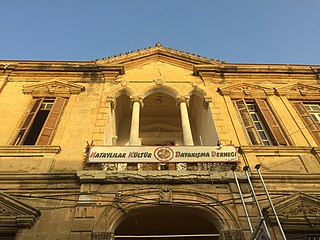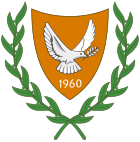
The Cyprus problem, also known as the Cyprus conflict, Cyprus issue, Cyprus dispute, or Cyprus question, is an ongoing dispute between the Greek Cypriot community which runs the Republic of Cyprus and the Turkish Cypriot community in the north of the island, where troops of the Republic of Turkey are deployed. This dispute is an example of a protracted social conflict. The Cyprus dispute's causes stem from ethnic Greek nationalist ideology, Greek-Cypriot sentiment, the Megali Idea and Enosis, and some of the ethnic Turkish peoples' desire for the partition of the island of Cyprus through Taksim as a means of protection of their people by what they considered to be the threat of Greek-Cypriots.

Northern Cyprus, officially the Turkish Republic of Northern Cyprus (TRNC), is a de facto state that comprises the northeastern portion of the island of Cyprus. It is recognised only by Turkey, and its territory is considered by all other states to be part of the Republic of Cyprus.

Rauf Raif Denktaş was a Turkish Cypriot politician, barrister and jurist who served as the founding president of Northern Cyprus. He occupied this position as the president of the Turkish Republic of Northern Cyprus between the declaration of the de facto state by Denktaş in 1983 and 2005, as the president of the Turkish Federated State of Cyprus between 1975 and 1983 and as the president of the Autonomous Turkish Cypriot Administration between 1974 and 1975. He was also elected in 1973 as the vice-president of the Republic of Cyprus.

Efstathios "Tassos" Nikolaou Papadopoulos was a Cypriot politician and barrister, who served as President of Cyprus from 2003 to 2008.

The Democratic Party is a Greek-Cypriot nationalist, centrist political party in Cyprus founded in 1976 by Spyros Kyprianou.

Mehmet Ali Talat is a Turkish Cypriot politician who served as the president of Northern Cyprus from 2005 to 2010. Talat was the leader of the social democratic Republican Turkish Party, from 1996 to 2005 and 2015 to 2016. He became prime minister in 2004, and subsequently won the presidential election held on 17 April 2005. Talat was inaugurated on 25 April 2005, succeeding retiring leader Rauf Denktaş. He lost the presidential election of 2010 and was replaced by Derviş Eroğlu as President.

The Annan Plan, also known as the Cyprus reunification plan, was a United Nations proposal to resolve the Cyprus dispute. The different parts of the proposal were based on the argumentation put forward by each party in meetings held under the auspices of the UN. The proposal was to restructure the Republic of Cyprus to become the "United Republic of Cyprus", a federation of two states. It was revised a number of times before it was put to the people of Cyprus in a 2004 referendum, and was supported by 65% of Turkish Cypriots, but only 24% of Greek Cypriots.

In order to find a solution to the Cyprus dispute, which started in 1963, numerous plans and meetings in international arena were organized and eventually United Nations determined the solution to be "bi-zonal and bi-communal federation" based on the political equality of Greek Cypriot and Turkish Cypriot people. According to United Nations' 2004 Annan Plan for the reunification of Cyprus, the proposed United Cyprus Republic would consist of two constituent states, the Greek Cypriot State and Turkish Cypriot State, which would be governed by Greek Cypriots and Turkish Cypriots respectively.

The Politics of Northern Cyprus takes place in a framework of a semi-presidential representative democratic republic, whereby the president is head of state and the prime minister is the head of government, and of a multi-party system. Executive power is exercised by the government. Legislative power is vested in both the government and the Assembly of the Republic. The judiciary is independent of the executive and the legislature.
Cypriot refugees are the Cypriot nationals or Cyprus residents who had their main residence in an area forcibly evacuated during the Cyprus conflict. The government of Cyprus also recognizes as refugees the descendants of the original refugees in the male line regardless of place of birth.

Presidential elections were held in Cyprus on 16 February 2003. The election campaign was dominated by the ongoing negotiations over the Annan Plan for Cyprus. Incumbent President Glafkos Klerides was largely in favour of the plan, while leading opposition candidate Tassos Papadopoulos wanted substantial amendments before he would accept it. Papadopoulos in the first round with 52% of the vote. Voter turnout was 91%.
Several distinct periods of Cypriot intercommunal violence involving the two main ethnic communities, Greek Cypriots and Turkish Cypriots, marked mid-20th century Cyprus. These included the Cyprus Emergency of 1955–59 during British rule, the post-independence Cyprus crisis of 1963–64, and the Cyprus crisis of 1967. Hostilities culminated in the 1974 de facto division of the island along the Green Line following the Turkish invasion of Cyprus. The region has been relatively peaceful since then, but the Cyprus dispute has continued, with various attempts to solve it diplomatically having been generally unsuccessful.

The largest enlargement of the European Union (EU), in terms of number of states and population, took place on 1 May 2004.
The Akritas plan, was an inside document of the Greek Cypriot secret organisation of EOK that was authored in 1963 and was revealed to the public in 1966. It entailed the weakening of the Turkish Cypriots in the government of Cyprus and then uniting (enosis) Cyprus with Greece. According to Turkish Cypriots, the plan was a "blueprint to genocide", but Greek Cypriots claimed that it was rather a “defensive plan”.

Turkish Cypriots and the European Union have somewhat strained relations because the European Union (EU) does not recognise the self-declared Turkish Republic of Northern Cyprus.
A joint declaration was made on 11 February 2014 at the start of renewed negotiations to settle the Cyprus dispute. The following talks between Nicos Anastasiades, President of Cyprus, and Derviş Eroğlu, President of Northern Cyprus, were stalled in October 2014.

The Turkish settlers, also referred to as the Turkish immigrants, are a group of Turkish people from Turkey who have settled in Northern Cyprus since the Turkish invasion of Cyprus in 1974. It is estimated that these settlers and their descendants now make up about half the population of Northern Cyprus. The vast majority of the Turkish settlers were given houses and land that legally belong to Greek Cypriots by the government of Northern Cyprus, who is solely recognised by Turkey. The group is heterogeneous in nature and is composed of various sub-groups, with varying degrees of integration. Mainland Turks are generally considered to be more conservative than the highly secularized Turkish Cypriots, and tend to be more in favor of a two-state Cyprus. However, not all settlers support nationalist policies.
Greek Cypriot nationalism, also known as Cypriot Hellenism, is a form of ethnic nationalism emphasising the Greekness of the Cypriot nation. It is not the same as Greek nationalism, the main goal of which is the integration of Cyprus into Greece—a process known as enosis. Having abandoned the idea of enosis, Greek Cypriot nationalists now aim to establish a Greek Cypriot-controlled state with close relations to Greece, which they see as their "motherland". Variants of Greek Cypriot nationalism have been espoused across Cyprus' political spectrum by the centre-left Movement for Social Democracy, the centre-right Democratic Party and Democratic Rally, and the right-wing New Horizons, as well as the Church of Cyprus.
Events in the year 2003 in Cyprus.
Northern Cyprus and the United States do not have official diplomatic relations as the United States does not recognize Northern Cyprus as a sovereign nation and instead recognizes the region of Northern Cyprus as part of Cyprus. Despite no formal relations between the two nations, Northern Cyprus has appointed Ambassadors to the United States and has a representative office in Washington, D.C. which serves as its de facto embassy. Northern Cyprus also maintains a Representative office in New York City serving as a de facto consulate-general and as a de facto Permanent Mission to the United Nations. The United States on the other hand has a diplomatic office in North Nicosia as part of its embassy in Nicosia to Cyprus.















